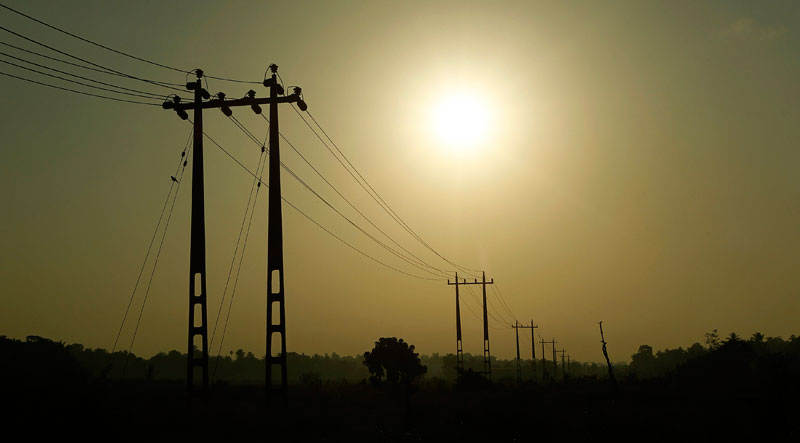Sunday Feb 22, 2026
Sunday Feb 22, 2026
Thursday, 6 July 2023 00:37 - - {{hitsCtrl.values.hits}}

By Jaimes Kolantharaj and Jiwan Acharya
The Asian Development Bank (ADB), in collaboration with the Government of Sri Lanka, is currently holding a regional power trade workshop in Colombo from 4 to 6 July. The workshop aims to disseminate the key learnings and outcomes from the regional energy cooperation program supported by ADB.
In the backdrop of increasing economic growth, the South Asia (SA) region is expected to experience a commensurate rise in the power demand at a rapid pace in the near future. With the SA countries having distinctive development plans, economic profiles, energy consumption patterns and energy baskets, enhancing regional energy cooperation through cross border electricity trade (CBET) has been decisive for the countries in meeting the increasing power demand.
The ADB SASEC Operational Plan 2016-2025 for energy sector has been a major building block towards accelerating intra-SASEC electricity trade1
ADB has been a major development partner in SA’s regional power trade and has played a catalytic role in overcoming the lack of domestic capital/credit and lowering investment barriers for the countries in the region via loans or grants and technical assistance projects through the SASEC program.
Facilitating the development of India-Sri Lanka transmission interconnection
Considering the energy supply shocks experienced by Sri Lanka in recent years, the development of the interconnector would ensure reliable and uninterrupted power supply at competitive prices from India. The project will further contribute towards efforts in establishing the SA regional electricity grid and facilitate RE-based CBET in the region. The project has been under discussion since 2002, with a memorandum of understanding (MoU) for India-Sri Lanka electricity grid interconnection signed among the Government of Sri Lanka (GoSL), Government of India (GoI), Ceylon Electricity Board (CEB) and Power Grid Corporation of India Ltd. (PGCIL) in June 2010. However, the project was found to be economically and financially unviable for the construction options and ownership models earlier assessed.
Sri Lanka being heavily reliant on imported fossil fuels, has been facing numerous power outages and interruptions in recent years due to energy supply shocks. This coupled with the ongoing economic turmoil and surge in fuel prices has led to tariff hikes for the end consumer. Owing to these developments in recent years, GoSL is looking forward to fast-track the implementation of the project. The development of the interconnector would ensure reliable and uninterrupted power supply at competitive prices and would reduce fossil fuel volatility in future for Sri Lanka. Moreover, the interconnection would unlock opportunities for power exports, trilateral/multilateral power trade, meeting its Nationally Determined Contributions (NDCs), and also supplement Sri Lanka’s contribution to global public goods.
Based on the technical studies carried out earlier, the GoSL officially requested ADB to conduct due diligence of the proposed interconnection project for enabling GoSL to take necessary steps to fast-track the implementation of the project. The key findings from the assessments are highlighted below:
Key challenges for the proposed interconnection
Based on the assessments, the project was found to be financially and economically viable. However, there are certain challenges which may need to be worked upon and require adequate interventions. Smooth execution of the proposed interconnection would require necessary amendments in the Sri Lankan regulations and policies, and development of an appropriate regulatory framework for CBET. Additionally, based on the selected business model, contractual agreement needs to be carefully drafted considering the value proposition and dispute resolution mechanism.
To attract private sector participation, the GoSL and GoI may need to provide additional incentives. Moreover, considering the ongoing finance turmoil in Sri Lanka, raising finance at concession rates will be critical to reduce project costs and enhance viability.
Way forward for project implementation
Given the project’s complexity in terms of technical and financing requirements, different commercial/regulatory regimes across both nations, multiple actions need to be undertaken by both the governments for effective implementation of the project. The selection of development model and commercial arrangements/cost-recovery mechanism is critical and needs to be finalised in discussion with the relevant stakeholders from both the countries.
Additionally, the synergy with the GoI will be crucial for the successful implementation of the proposed interconnection, by expediting the approvals for exporting/importing power, and sharing experience/learnings on emerging O&M technologies used in existing similar transmission projects. Given the unique challenges of this interconnection, as next steps, GoSL and CEB will have to closely follow up each of milestones and timeframes set for the proposed interconnection.
Apart from supporting CEB in conducting the economic and financial viability assessments, ADB has played a key role in commissioning and disseminating to relevant stakeholders the findings of technical studies. .
Furthermore, ADB’s insights from the earlier CBET interconnection projects in the region can be leveraged for the sustained development of the project, thereby promoting regional prosperity, and improving economic opportunities in the region.
Footnotes:
1https://www.adb.org/documents/sasec-operational-plan-2016-
2025#:~:text=The%20SASEC%20Operational%20Plan%20for,trade%20facilitation%2C%20and%20energy%20cooperation.
2https://unfccc.int/sites/default/files/NDC/2022-
06/Amendmend%20to%20the%20Updated%20Nationally%20Determined%20Contributions%20of%20Sri%20Lanka.pdf
(Jaimes Kolantharaj is Senior Energy Specialist, Country Focal for SL energy sector operations at ADB and Jiwan Acharya Principal Energy Specialist at ADB.)